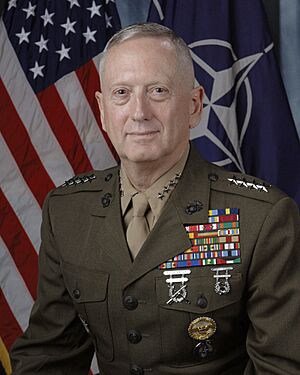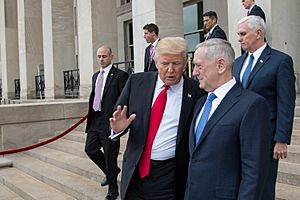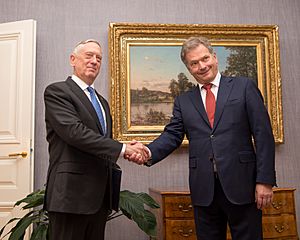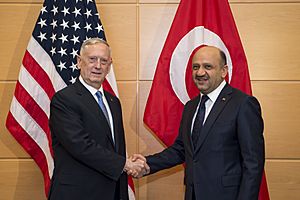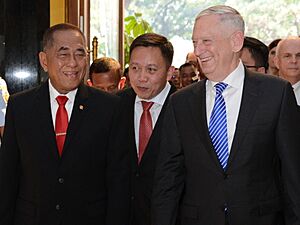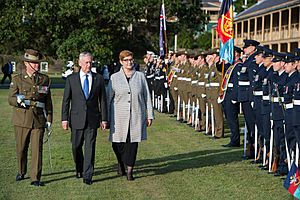Jim Mattis facts for kids
Quick facts for kids
Jim Mattis
|
|
|---|---|
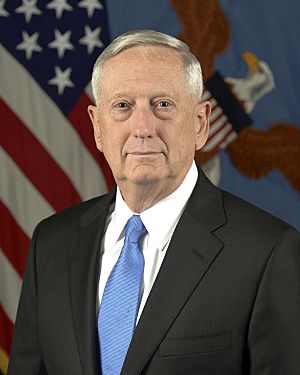
Official portrait, 2017
|
|
| 26th United States Secretary of Defense | |
| In office January 20, 2017 – January 1, 2019 |
|
| President | Donald Trump |
| Deputy | Robert O. Work Patrick M. Shanahan |
| Preceded by | Ash Carter |
| Succeeded by | Mark Esper |
| 11th Commander of the United States Central Command | |
| In office August 11, 2010 – March 22, 2013 |
|
| President | Barack Obama |
| Preceded by | David Petraeus |
| Succeeded by | Lloyd Austin |
| 5th Commander of the United States Joint Forces Command | |
| In office November 9, 2007 – August 11, 2010 |
|
| President |
|
| Preceded by | Lance L. Smith |
| Succeeded by | Raymond T. Odierno |
| 3rd Supreme Allied Commander Transformation | |
| In office November 9, 2007 – September 8, 2008 |
|
| Deputy | Luciano Zappata |
| Preceded by | Lance L. Smith |
| Succeeded by | Stéphane Abrial |
| Personal details | |
| Born |
James Norman Mattis
September 8, 1950 Pullman, Washington, U.S. |
| Political party | Independent |
| Spouse |
Christina Lomasney
(m. 2022) |
| Education | |
| Signature | |
| Nicknames |
|
| Military service | |
| Branch/service | United States Marine Corps |
| Years of service | 1969–2013 |
| Rank | General |
| Commands |
|
| Battles/wars |
|
| Awards |
|
James Norman Mattis (born September 8, 1950) is an American military veteran. He served as the 26th United States secretary of defense from 2017 to 2019. He was a retired four-star general in the Marine Corps. General Mattis led troops in the Persian Gulf War, the War in Afghanistan, and the Iraq War.
Mattis joined the Marine Corps through a special training program after college. He became known as a very smart and dedicated Marine. He rose through the ranks to become a general. From 2007 to 2010, he led the United States Joint Forces Command. He also served as NATO's Supreme Allied Commander Transformation. Later, he was the commander of United States Central Command from 2010 to 2013. After leaving the military, he worked in different private jobs.
President-elect Donald Trump chose Mattis to be the secretary of defense. The Senate approved him on January 20, 2017. As secretary of defense, Mattis promised that the United States would protect its ally, South Korea. This was important during the 2017 North Korea crisis. Mattis believed that China and Russia were a "threat to the American-led world order." He sometimes disagreed with President Trump's choices. These included leaving the Iran nuclear deal and pulling troops from Syria and Afghanistan.
On December 20, 2018, Mattis announced he would resign. This happened after he could not convince Trump to keep American troops in Syria. His resignation was supposed to happen in February 2019. However, Trump moved the date to January 1, 2019.
Contents
Early Life and Education
James Mattis was born on September 8, 1950, in Pullman, Washington. His mother worked in Army Intelligence during Second World War. His father was a merchant mariner. Mattis grew up in a home that loved books and did not have a television. He said he often hitchhiked from age 12 until he joined the Marines.
He finished high school in 1968. He earned a degree in history from Central Washington University in 1971. In 1994, he earned a master's degree in international security affairs. This was from the National War College.
Marine Corps Career
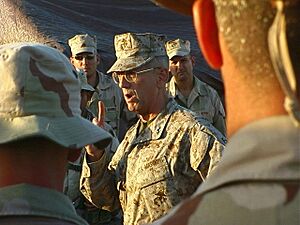
Mattis joined the Marine Corps Reserve in 1969. He became an officer in 1972. He was known as an "intellectual" among military leaders. One retired general called him "one of the most urbane and polished men I have known." As a young officer, he led rifle and weapons platoons. He also commanded companies and worked at a recruiting station.
As a lieutenant colonel, Mattis led the 1st Battalion, 7th Marines. This was during the Gulf War. He later commanded the 7th Marine Regiment.
Mattis studied military and world history deeply. He had a personal library of over 7,000 books. He often gave reading lists to his Marines. He wanted them to learn about the culture and history of places where they would serve. For example, Marines going to Iraq had "cultural sensitivity training." He was sometimes called "Mad Dog" because of his energy. But Mattis said his actual nickname was "Chaos." This stood for "Colonel Has Another Outstanding Solution."
Leading in Afghanistan
Mattis led the 1st Marine Expeditionary Brigade. He was promoted to brigadier general. He led Task Force 58 in southern Afghanistan in November 2001. This made him the first Marine Corps officer to lead a Naval Task Force in combat.
In December 2001, a US bomber accidentally hit American troops. Many men were hurt. Mattis was criticized for not sending helicopters from a nearby base to rescue them quickly. An Air Force helicopter had to fly from far away to help. One captain said the delay caused some deaths.
While in Afghanistan, Mattis was known for his strong leadership. A young Marine officer saw him talking with his troops in a fighting hole. He said Mattis was "out on the lines with his Marines" on a freezing night.
Role in the Iraq War
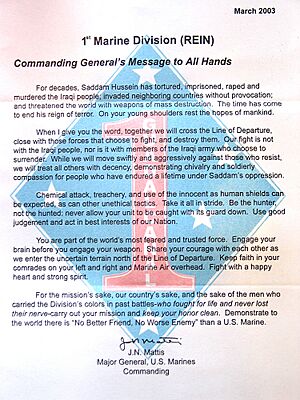
As a major general, Mattis led the 1st Marine Division during the 2003 invasion of Iraq. He played a key role in battles in Fallujah. He helped with talks during the First Battle of Fallujah. He also helped plan the Second Battle of Fallujah.
Mattis made the 1st Marine Division's motto famous: "no better friend, no worse enemy." This idea came from an ancient Roman leader. He also told his men to "fight with a happy heart." This phrase came from Native American traditions.
He made sure his Marines learned about Middle Eastern culture. He brought in experts for "cultural sensitivity training." He also encouraged his Marines to grow mustaches. This was to look more like the local people.
Mattis was also known for removing leaders who were not doing well. This was rare in the military. He once removed a colonel during the push to Baghdad. Mattis said it showed that officers could still be replaced if needed.
High-Level Commands
After being promoted to lieutenant general, Mattis led the Marine Corps Combat Development Command.
US Joint Forces Command
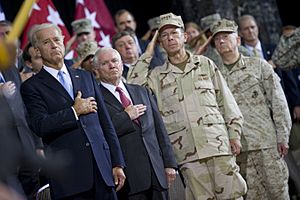
In 2007, Mattis was chosen to lead the United States Joint Forces Command (USJFCOM). He also became Supreme Allied Commander Transformation (SACT) for NATO. He was promoted to a four-star general. He led USJFCOM until 2010. As a four-star general, he always had an intelligence expert in his meetings. This person's job was to question any plans or ideas.
US Central Command
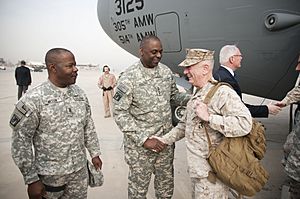
In 2010, Mattis was nominated to lead the United States Central Command (CENTCOM). He took command on August 11, 2010. As head of CENTCOM, Mattis oversaw the wars in Iraq and Afghanistan. He was also responsible for areas like Syria, Iran, and Yemen. He wanted the Obama administration to be tougher on Iran. He asked for permission to shoot down Iranian aircraft that attacked US drones. However, the Obama administration did not allow this. Some White House staff felt he was too eager for military action against Iran.
Mattis retired in March 2013.
Civilian Life
After retiring from the military, Mattis worked as a consultant. He also joined the board of directors for General Dynamics, a large company. He was a visiting fellow at the Hoover Institution.
In 2015, Mattis joined the advisory board of Spirit of America. This is a non-profit group that helps American service members and local people. He also co-edited a book called Warriors & Citizens: American Views of Our Military.
From 2013 to 2017, Mattis was on the board of Theranos. This was a health technology company. It claimed to have new blood tests that used very little blood. Later, it was found that these claims were not true.
In 2019, Mattis published his autobiography, Call Sign Chaos: Learning to Lead. The book also argued for countries working together in foreign policy.
Secretary of Defense (2017–2019)
Becoming Secretary of Defense
President-elect Donald Trump met with Mattis in November 2016. Trump later said Mattis was "very impressive." On December 1, 2016, Trump announced he would nominate Mattis for secretary of defense.
A law requires retired military officers to wait seven years before becoming secretary of defense. Mattis had not waited that long. So, Congress had to vote to allow an exception for him. The Senate approved the exception by a vote of 81–17. The House approved it 268–151. Mattis was then confirmed as secretary of defense by the Senate on January 20, 2017. The vote was 98–1.
Time as Secretary of Defense
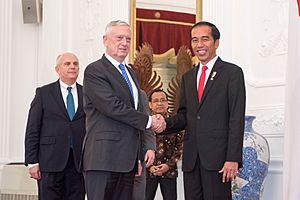
In February 2017, Mattis visited South Korea. He warned North Korea that any attack would be defeated. He said using nuclear weapons would lead to a strong response from the U.S. In March 2017, he said North Korea was acting "reckless." He stated they must be stopped. In June, he called North Korea a "clear and present danger."
In March 2017, Mattis supported keeping US troops in Iraq after the Battle of Mosul.
In April 2017, Mattis called the Khan Shaykhun chemical attack in Syria "a heinous act." He warned the Syrian government not to use chemical weapons again. He said Syria would pay a "very, very stiff price" if they did.
Mattis supported a military campaign led by Saudi Arabia in Yemen. He asked Trump to remove limits on US military help for Saudi Arabia.
In April 2017, Mattis visited Afghanistan. He said the US was "not winning" there. He planned to create a new strategy for Afghanistan.
The United States began arming Syrian Kurdish fighters in May 2017. This was to fight against ISIL. In January 2018, Turkey invaded northern Syria. This was to remove the US-backed Syrian Kurds. Mattis said Turkey had "legitimate security concerns."
On April 13, 2018, Mattis announced missile strikes against Syria. These strikes targeted chemical weapon sites. He said the US, France, and the UK sent a clear message to Syria. They would be held responsible for any more chemical attacks.
Disagreements and Resignation
In September 2018, Mattis suggested a general for a top military role. But Trump chose a different general instead.
On December 19, 2018, Trump announced that US troops would leave Syria right away. Mattis had wanted troops to stay. The next day, Mattis resigned. He could not convince Trump to change his mind. His resignation letter seemed to criticize Trump's views. He praised NATO and the anti-ISIS group. He also stressed treating allies with respect. He said Trump had "the right to have a Secretary of Defense whose views are better aligned with [his]." His resignation worried many US allies.
Mattis's resignation was supposed to be effective on February 28, 2019. But Trump moved the date to January 1, 2019. Trump said he had "essentially fired him." However, Trump's chief of staff, John F. Kelly, said Mattis was not fired. He said Mattis was an "honorable man."
After Being Secretary of Defense
After leaving the White House, Mattis did not talk much about the Trump administration at first. He said, "If you leave an administration, you owe some silence." But he later spoke out. He was "angry and appalled" by how peaceful protesters were treated in June 2020. Trump responded by saying he was "Glad he is gone!"
In 2019, Mattis joined The Cohen Group as a senior advisor.
In January 2021, Mattis and all other living former secretaries of defense wrote an article. They told President Trump not to involve the military in the 2020 election results.
Personal Life
Mattis was single for most of his career. He was nicknamed "The Warrior Monk." This was because he never married and spent his life studying war. He is an enthusiastic reader. He has 7,000 books in his personal library. He recommends Meditations by Marcus Aurelius for everyone to read. He also said Robert Heinlein's Starship Troopers helped him think about training for soldiers.
Mattis married physicist and business executive Christina Lomasney in June 2022. He does not have children. He is a Catholic and is described as "devout."
Awards and Honors
Mattis has received many military awards and decorations. These include:
- Defense Distinguished Service Medal (twice)
- Navy Distinguished Service Medal
- Defense Superior Service Medal
- Legion of Merit
- Bronze Star Medal (with Valor device)
- Meritorious Service Medal (three times)
- Combat Action Ribbon
- And many more unit awards and campaign medals.
He also received several civilian awards, such as:
- 2009: Center for National Policy's Edmund S. Muskie Distinguished Public Service Award
- 2010: Atlantic Council's Distinguished Military Leadership Award
- 2013: World Affairs Council of Greater Hampton Roads "Ryan C. Crocker Global Citizen of the Year" Award
- 2014: Marine Corps University Foundation Semper Fidelis Award
- 2014: Washington College honorary doctor of laws degree
- 2016: Washington Policy Center Champion of Freedom Award recipient
- 2021: Elected as a member of the American Academy of Arts and Sciences
- 2021: Honorary Companion of the Order of Australia
Images for kids
-
Mattis receiving the Distinguished Military Leadership Award from Michael Mullen in Washington, D.C.
-
Mattis with Saudi Arabia's prince Mohammad bin Salman.
See also
 In Spanish: James Mattis para niños
In Spanish: James Mattis para niños
- List of United States Marine Corps four-star generals


